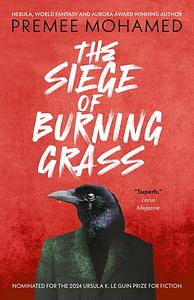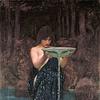Take a photo of a barcode or cover
challenging
dark
emotional
tense
slow-paced
Plot or Character Driven:
A mix
Strong character development:
Complicated
Loveable characters:
Yes
Diverse cast of characters:
Complicated
Flaws of characters a main focus:
Yes
dark
mysterious
tense
slow-paced
challenging
dark
reflective
slow-paced
challenging
dark
emotional
reflective
slow-paced
Plot or Character Driven:
A mix
Strong character development:
No
Loveable characters:
Complicated
Diverse cast of characters:
Yes
Flaws of characters a main focus:
Yes
adventurous
emotional
tense
slow-paced
Plot or Character Driven:
Plot
Strong character development:
Yes
Loveable characters:
Complicated
Diverse cast of characters:
Yes
Flaws of characters a main focus:
Complicated
adventurous
challenging
reflective
slow-paced
Plot or Character Driven:
A mix
Strong character development:
No
Loveable characters:
No
Diverse cast of characters:
No
Flaws of characters a main focus:
Yes
dark
reflective
medium-paced
Plot or Character Driven:
A mix
Strong character development:
Yes
Loveable characters:
Complicated
Diverse cast of characters:
Yes
Flaws of characters a main focus:
Yes
challenging
dark
reflective
tense
medium-paced
Plot or Character Driven:
A mix
Strong character development:
Yes
Loveable characters:
Complicated
Diverse cast of characters:
Yes
Flaws of characters a main focus:
Yes
The blurb describes this as a meditation on war, and for the first half, I think that's the right word. It's a very contemplative journey, focused not on the actions so much as how they interact with the idea of pacifism. It asks, through example, where the line is between abstention from violence as an act of resistance versus one of inaction or abdication of duty. It also is very interested in who we consider human, and the ways in which we dehumanize our enemies.
Alefret, our main character and a pacifist, is immediately sympathetic to the reader. He's being tortured by his own country for the crime of opposing the war, captured in the act of trying to save children and elders from a bombing. But he's not a saint either: he expresses qualms about the hardline stances on pacifism of some of his peers, and holds soldiers in outright contempt, to the point that when he is warned if things go on like this the whole country will die he says, "good", because the soldiers will be dead.
His soldier companion, Qhudur, is cruel and bigoted and easy to hate, yet he's clearly done a similar grotesque calculus and come out on the other side of it. Alefret protests that people have died, and the soldier responds, "they are not the only people." His goal is to protect an abstract someone, which is different than protecting an abstract anyone or everyone. You can't save everyone, he seems to have decided, which excuses him the sin of killing a series of someones (children included) in service of whoever's left at the end. This is certainly less sympathetic than Alefret, but you start (whether you want to or not) trying to see where the coherence may come from, where he can see himself as moral and maybe, once we see more, we might understand him as moral as well.
I liked the contemplation here a lot, and if the book had been nothing but a sad series of failures as Alefret grapples with with maintaining his integrity while confronted with horror after horror, I would have enjoyed it more. As it moves into the action, it loses touch with the hard questions, or perhaps they stop being as hard. The finale sequence felt sudden, and was not helped by action sequences that I struggled to visualize. I could never quite orient myself. Scenes transitioned and people had come to conclusions I didn't follow. I felt like I had missed something. In Alefret and Qhudur's last exchange, I'm sure I missed something.
The result is something strange and optimistic in a way I couldn't stomach after the first half. I think I liked it, overall, but what started out as something stunning really lost its shine for me by the end. I don't know. I keep coming back to this: I think I missed something. It doesn't make sense to me that the world you describe can be wrapped up like this. Perhaps the dissonance is the point. Perhaps it says something about me, about the world I'm in, that I can only imagine tragedy. I'm trying and failing to find what i mean to reference here—I suspect it's Le Guin—but it's not enough just to tell me a story, you must tell me something true. And the end, I felt, was telling me a story, whereas the more menial struggles of the first half felt true.
My disappointment here is off-putting, I realize that. I do, honestly, recommend this book. The world with its engineered animals where we'd have machines is fascinating, and the prose is gorgeous. It's asking good questions and presenting interesting scenarios. It's worth deciding for yourself if it's "true". Whatever it was I was missing in the back half, maybe you have it. I sincerely believe it's worth a shot. I am glad that I read this.
Alefret, our main character and a pacifist, is immediately sympathetic to the reader. He's being tortured by his own country for the crime of opposing the war, captured in the act of trying to save children and elders from a bombing. But he's not a saint either: he expresses qualms about the hardline stances on pacifism of some of his peers, and holds soldiers in outright contempt, to the point that when he is warned if things go on like this the whole country will die he says, "good", because the soldiers will be dead.
His soldier companion, Qhudur, is cruel and bigoted and easy to hate, yet he's clearly done a similar grotesque calculus and come out on the other side of it. Alefret protests that people have died, and the soldier responds, "they are not the only people." His goal is to protect an abstract someone, which is different than protecting an abstract anyone or everyone. You can't save everyone, he seems to have decided, which excuses him the sin of killing a series of someones (children included) in service of whoever's left at the end. This is certainly less sympathetic than Alefret, but you start (whether you want to or not) trying to see where the coherence may come from, where he can see himself as moral and maybe, once we see more, we might understand him as moral as well.
I liked the contemplation here a lot, and if the book had been nothing but a sad series of failures as Alefret grapples with with maintaining his integrity while confronted with horror after horror, I would have enjoyed it more. As it moves into the action, it loses touch with the hard questions, or perhaps they stop being as hard. The finale sequence felt sudden, and was not helped by action sequences that I struggled to visualize. I could never quite orient myself. Scenes transitioned and people had come to conclusions I didn't follow. I felt like I had missed something. In Alefret and Qhudur's last exchange, I'm sure I missed something.
The result is something strange and optimistic in a way I couldn't stomach after the first half. I think I liked it, overall, but what started out as something stunning really lost its shine for me by the end. I don't know. I keep coming back to this: I think I missed something. It doesn't make sense to me that the world you describe can be wrapped up like this. Perhaps the dissonance is the point. Perhaps it says something about me, about the world I'm in, that I can only imagine tragedy. I'm trying and failing to find what i mean to reference here—I suspect it's Le Guin—but it's not enough just to tell me a story, you must tell me something true. And the end, I felt, was telling me a story, whereas the more menial struggles of the first half felt true.
My disappointment here is off-putting, I realize that. I do, honestly, recommend this book. The world with its engineered animals where we'd have machines is fascinating, and the prose is gorgeous. It's asking good questions and presenting interesting scenarios. It's worth deciding for yourself if it's "true". Whatever it was I was missing in the back half, maybe you have it. I sincerely believe it's worth a shot. I am glad that I read this.
adventurous
challenging
dark
reflective
tense
medium-paced
Plot or Character Driven:
A mix
Strong character development:
Complicated
Loveable characters:
Complicated
Diverse cast of characters:
Yes
Flaws of characters a main focus:
Yes









